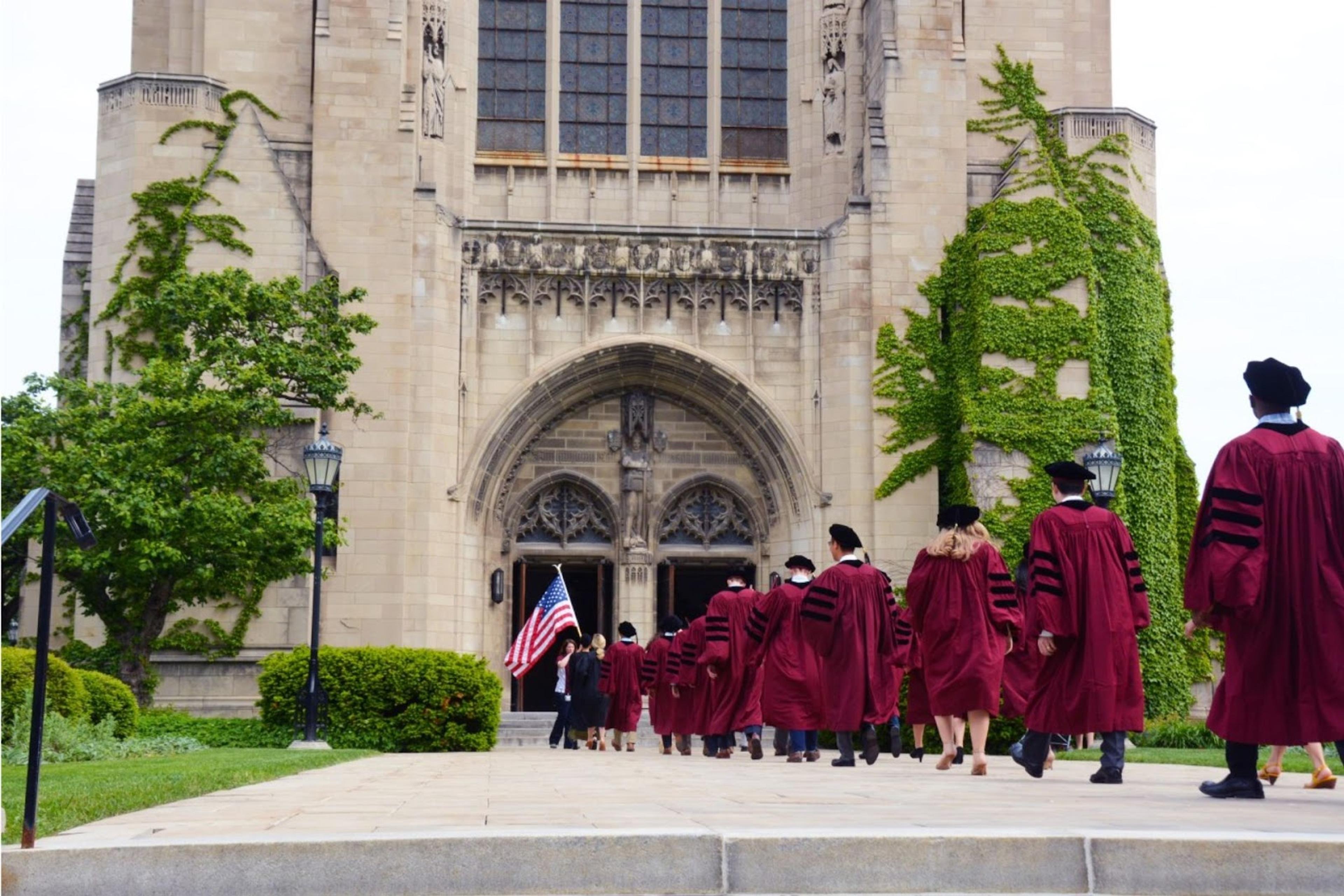How to Get Into UCSF School of Medicine: Acceptance Rate, Tuition, & Prerequisites
Discover everything you need to know about the prestigious UCSF School of Medicine, including admissions requirements, available programs, and tuition costs.
Posted March 13, 2025

Table of Contents
If you're considering pursuing a medical education, UCSF School of Medicine is a top-tier institution that should be on your radar. Known for its cutting-edge research and commitment to advancing healthcare, the UCSF medical school offers a wide range of educational opportunities for prospective students. However, before you decide if UCSF is the right fit for you, it's important to understand the admissions process, available programs, and the costs associated with attending.
MD Class Profile (Class of 2026)
- Applicants: 9,090
- Interviews Offered: 544
- Class Size: 167
- Acceptance Rate: 1.8%
- Median GPA: 3.87
- Median MCAT: 90th percentile (about 515)
- CA Residents: 71%
- Underrepresented in Medicine: 54%
- Female Students: 57%
UCSF School of Medicine MD Application Process
The application process to the MD program at UCSF is highly competitive, with an acceptance rate of about two percent. UCSF seeks applicants who will improve the health of local communities and alleviate suffering due to illness and disease in patients and can demonstrate academic excellence, critical thinking, a spirit of inquiry, and commitment to health equity.
Like most medical schools, UCSF accepts primary applications through AMCAS and requires secondary applications and interviews for admission.

Academic Prerequisites
To be eligible to apply, you’ll need to hold a bachelor’s degree from an accredited institution. Online and pass/no pass courses and up to 105 quarter credits of community college coursework are accepted. You’ll also need to complete coursework in the following subjects:
- Biology: One year with lab, may include biochemistry
- AP credit may be used to fulfill this requirement if college credit was earned
- Chemistry: One year with lab, may include biochemistry
- AP credit may be used to fulfill this requirement if college credit was earned
- Biochemistry: one semester or quarter
- Physics: one semester or two quarters
Application Deadlines (2023-2024 Cycle)
| AMCAS Application Opens | May 3, 2023 |
| AMCAS Application Submissions Open | May 31, 2023 |
| Secondary Application Opens | Mid July 2023 |
| Interviews Begin | Late September 2023 |
| AMCAS Application Due | October 15, 2023 |
| Secondary Application Due | November 2023 |
| Interviews End | Early February 2024 |
| Admissions Decisions Go Out | February 2024 |
Deadlines for the 2024-2025 application cycle have not been released yet, so stay up-to-date with the admissions page.

AMCAS Application
- Identifying Information: You’ll submit your biographic information here.
- Schools Attended: You’ll need to enter all high schools, colleges, and universities attended, as well as official college and university transcripts.
- Biographic Information: Here, you’ll enter additional personal information, such as language proficiency, residency, and any challenges you have faced.
- Coursework: Enter all postsecondary courses you took. These will be used to determine your AMCAS GPA.
- Work/Activities: You’ll enter up to 15 experiences here, such as employment, extracurriculars, honors and awards, and publications.
- Letters of Evaluation: UCSF requires you to submit between three and five letters of evaluation. At least two letters should be from faculty who have taught you or supervised you in research.
- If your undergraduate institution has a pre-health committee, UCSF expects you to obtain a committee packet or letter.
- Essays: You’ll need to submit a personal comments essay of 5,300 characters or less explaining why you are pursuing medicine. This essay is sent to all medical programs you apply for.
- If you’re applying for the Medical Scientist Training Program (MSTP), UCSF’s MD/PhD program, you’ll need to submit two additional essays, the MD/PhD essay and the Significant Research Experience essay. If your work was published, you should include the full citation in the Work/Activities section.
- Standardized Tests: In this section, you’ll submit your MCAT scores from a test within three years of your expected matriculation. You can also submit scores from any AAMC Preview, LSAT, GRE, GMAT, or MAT exams.
- Fees: Finally, you’ll need to pay a $175 application for the first medical school you apply for and $45 for additional schools.
For more information, see the 2024 AMCAS Applicant Guide.

Secondary Application
In your secondary application, you’ll need to pay an application fee ($80 for US citizens and permanent residents, $100 for international students) and indicate if you are applying for the following programs:
- UC Berkeley-UCSF Joint Medical Program (JMP): Students in this program earn an MD from UCSF’s School of Medicine and an MS in Health and Medical Sciences from UC Berkeley’s School of Public Health.
- Medical Scientist Training Program (MSTP): This MD/PhD program trains students to become physicians and researchers in topics such as medical anthropology, bioengineering, and neuroscience.
- Program in Medical Education for the Underserved (PRIME-US): This five-year MD program is designed for students committed to serving patients in urban underserved communities.
- San Joaquin Valley Program in Medical Education (SJV PRIME): The SJV PRIME track trains students to serve patients and communities in the San Joaquin Valley.
You may also choose to answer the following optional questions:
- If you wish to update or expand upon your activities, you may provide additional information below. (500 words)
- If you are a 2023 or earlier college graduate, please use the space below to tell us what you have done since completing your undergraduate degree. (350 words)
- Do you identify as being part of a marginalized group socioeconomically or in terms of access to quality education or healthcare? Please describe how this inequity has impacted you and your community. (350 words)

UCSF Interviews
About six percent of applicants are invited by the UCSF School of Medicine to interview for admission. All interviews are currently virtual and last about forty minutes each, with either two professors or one professor and one current student.
Our Tips for Acing the UCSF Interview:
- Your interviewer will most likely have reviewed your application in depth, so try emphasizing experiences and qualities that are not already listed in your application.
- Consider the UCSF mission statement: “to educate learners who will improve the health of our communities and alleviate suffering due to illness and disease in our patients” and the MD program core competencies: patient care, medical knowledge, practice-based learning and improvement, interpersonal and communication skills, professionalism, systems-based practice, and interprofessional collaboration.
- Come with questions: this is also your opportunity to learn more about the medical education, community outreach, patient care, and learning environment at UCSF, and thoughtful questions can help demonstrate genuine interest in the school.
- Practice, practice, practice! An experienced admissions coach can support you through the application and interview and help you determine which personal qualities will make you stand out.
UCSF School of Medicine MD Curriculum Overview
The medical education at UCSF is divided into three main stages: Foundations 1, Foundations 2, and Career Launch, each of which prepares students to work in interprofessional teams to deliver compassionate patient care. The four main teaching campuses are UCSF Medical Center/Moffitt-Long Hospital, UCSF/Mount Zion Medical Center, Zuckerberg San Francisco General Hospital, and the Veterans Administration Medical Center, with sixty additional training sites.
Foundations 1
The first phase of UCSF’s medical education is 18 months long, with a focus on inquiry through its Core Inquiry Curriculum. First-year students will take Foundational Sciences, or blocks, covering topics such as the life stages, diagnostic reasoning, and public health. They’ll also have two weeks of Inquiry Immersion, in which classes are paused and they participate in workshop, selective, and didactic mini-courses led by UCSF researchers on their current scholarship, with wide-ranging topics including drug design, immigration, reproductive health, and cosmetic psychiatry.
Students will also begin the two-year Clinical Microsystems Clerkship, in which they’ll work together in groups of five to six in the Kanbar Center for Simulation and Clinical Skills and in patient care settings under the guidance of a faculty physician coach. They’ll also participate in health systems improvement efforts at UCSF Health, San Francisco Veterans Affairs Health Care System, and Zuckerberg San Francisco General Hospital and Trauma Center.
Physician Identity weeks, which continue throughout the four-year program, also begin in this stage. Centered around the themes of learning skills, professional identity formation, relationship building, community-engaged learning and advocacy, and career discovery and development, these weeks promote professional development and reflection.
Students will also participate in group-based learning through inquiry cases and journal clubs and learn about cutting-edge medical research through the Frontiers in Medicine lecture series.

Foundations 2
In the 48-week second stage of the MD curriculum, students will gain practical experience through core clerkships in internal medicine, surgery, obstetrics and gynecology, pediatrics, neurology, psychiatry, and anesthesia and a longitudinal clerkship in family medicine. These clerkships take place in a variety of locations, including the UCSF Medical Center at Mount Zion, the UCSF Medical Center at Parnassus Heights, and facilities affiliated with UCSF Health.
They’ll also continue participating in PI weeks and learning the foundational sciences. Students will also explore clinical specialties through Clinical Immersion Experiences and prepare for the USMLE Step 1 and the Clinical Performance Exam.
Career Launch
In the final stage, students develop advanced clinical and practical skills and prepare for their future residencies. Students will take Advanced Block-Based Clinical Rotations and a Specialty Practice Ambulatory Subinternship to advance their ambulatory, medicine, and acute/urgent care skills. They’ll also spend twelve to twenty weeks working on a Deep Explore Project with a faculty mentor, exploring a topic of their choice in UCSF’s domains of science: Biomedical, Clinical, Social and Behavioral, Epidemiology and Population, Education, or Health Systems Sciences. Finally, they’ll take an Introduction to Career Launch course and a Coda course preparing them for residency.

Cost of Attendance
As a public medical school, the UCSF School of Medicine is relatively more affordable, but the cost of attendance can still be a significant financial burden for many students. About 85% of UCSF students receive financial aid through scholarships and loans. Details about applying for financial aid can be found here.
| Year 1 | Year 2 | Year 3 | Year 4 | |
|---|---|---|---|---|
| Tuition | $12,264 | $12,264 | $16,352 | $16,352 |
| Non-Resident Fee | $12,245 | $12,245 | $12,245 | $12,245 |
| Professional Degree Supplemental Tuition | $25,977 | $25,977 | $25,977 | $25,977 |
| UCSF Fees | $1,938 | $1,938 | $2,077 | $2,077 |
| Insurance Fees | $7,401 | $7,401 | $7,401 | $7,401 |
| Books & Supplies | $600 | $600 | $600 | $300 |
| Estimated Living Expenses | $31,200 | $31,200 | $37,440 | $34,320 |
| Commute Costs | $795 | $1,200 | $2,000 | $1,400 |
| Licensure Exam Fee | NA | NA | $645 | NA |

FAQs
Q: How many shadowing hours do I need to apply?
- A: UCSF does not require applicants to have a certain amount of shadowing hours, but recommends applicants have clinical experience demonstrating interest in and knowledge of medicine.
Q: If I took the MCAT multiple times, how would my scores be evaluated?
- A: Only your most recent scores are considered.
Q: Where do rotations take place?
- A: Students will start out at UCSF’s primary teaching campuses then participate in rotations throughout the Bay Area beginning in the Foundations 2 stage.
Q: Does UCSF offer student housing?
- A: Yes, the locations and housing application process can be found here.
Check out these helpful resources as you apply to medical school:












